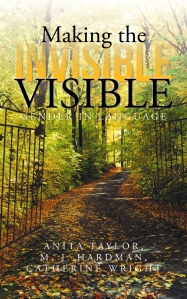
Title: Making the Invisible Visible
Author: A. Taylor, M.J. Hardman, C. Wright
Publisher: iUniverse
Pages: 172
Genre: Words/Language/Grammar
Format: Kindle
Purchase at AMAZON
All that is human is mediated through language. And because we learned the process of being human in a culture as we learned the language of that culture, much that we learned remains invisible to us. But even though invisible, it guides what and how we learn and remember, our perceptions, our behaviors, including communicative behaviors. Throughout our lives, that early language/culture learning affects us, all too often without our realizing. The discoveries about that early learning that this book makes possible enable readers to see through their language and learn to live productively and engage fully in mutually fulfilling relationships. This book talks back to the old adage, Sticks and stones can break my bones, but words can never hurt. We show how words do hurt, of course not by breaking bones, but by damaging self-confidence, reputations, livelihoods--or provoking people to the point of breaking bones--or worse. We focus on the roles of gender in language in effective or failed communication. We direct attention to invisible impacts of daily language use. When the invisible becomes visible, readers can see the many ways daily talk and interactions create and reinforce genders. We explore how language functions, its sources of power, and why it resists change even when negative impacts are clear. We explore how, in part through hidden gendering, English disadvantages many of its users and point to how the problems emerge in the ways gender functions in this supposedly non-gendered language. We describe how gendered language guides us to create and reinforce behaviors and relationships we do not intend. We conclude with suggestions of how to use English to reflect egalitarian values.
Anita Taylor, Professor Emerita of Communication and Women's Studies at George Mason University in Fairfax VA, focused on understanding gender in communication for over 30 years. With PhD from U. of Missouri-Columbia and M.S. from Kansas State University, she has sought help people live and work more effectively in a variety of gendered worlds. To contact Dr. Taylor, email her at ataylor@gmu.edu M J Hardman is Professor Emerita of Linguistics and Anthropology, and affiliated with Women's Studies at the University. of Florida. She has specialized in the Jaqi languages and in gender as manifested in language and culture. Dr. Hardman, has made a life-long study the Jaqi languages of Bolivia, Chile, and Peru; with her colleague and dear friend, Dimas Bautista, has published in print and on-line a grammar of the languages as well as making available bi-lingual learning materials and cultural resources. For more information, see http://clas.ufl.edu/users/hardman. Catherine K. Wright (PhD, Regent University, 2005) is the designer and primary architect of the web pages that provide support for this book. As undergraduate adviser and term Associate Professor of Communication at George Mason University she focuses on computer-mediated communication and the various means people use to transmit information to each other. Among other courses, she emphasizes media and society, business and professional communication, web development and communication. For more information, see http://classweb.gmu.edu/cwright5.
The authors are giving away a $25 Amazon Gift Card!

Terms & Conditions:
- By entering the giveaway, you are confirming you are at least 18 years old.
- One winner will be chosen via Rafflecopter to receive one $25 Amazon Gift Certificate or Paypal Cash.
- This giveaway begins June 2 and ends on June 14.
- Winners will be contacted via email on Monday, June 16.
- Winner has 48 hours to reply.


